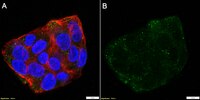MABS351-I-100UG Sigma-AldrichAnti-FAT10 Antibody, clone 4F1
Anti-FAT10, clone 4F1, Cat. No. MABS351-I, is a mouse monoclonal antibody that detects FAT10/Ubiquitin D and is tested for use in Immunocytochemistry, Immunoprecipitation, and Western Blotting.
More>> Anti-FAT10, clone 4F1, Cat. No. MABS351-I, is a mouse monoclonal antibody that detects FAT10/Ubiquitin D and is tested for use in Immunocytochemistry, Immunoprecipitation, and Western Blotting. Less<<Recommended Products
Overview
| Replacement Information |
|---|
| References |
|---|
| Product Information | |
|---|---|
| Format | Purified |
| Presentation | Purified mouse monoclonal antibody IgG2c in buffer containing 0.1 M Tris-Glycine (pH 7.4), 150 mM NaCl with 0.05% sodium azide. |
| Quality Level | MQ200 |
| Physicochemical Information |
|---|
| Dimensions |
|---|
| Materials Information |
|---|
| Toxicological Information |
|---|
| Safety Information according to GHS |
|---|
| Safety Information |
|---|
| Storage and Shipping Information | |
|---|---|
| Storage Conditions | Recommended storage: +2°C to +8°C. |
| Packaging Information | |
|---|---|
| Material Size | 100 μg |
| Transport Information |
|---|
| Supplemental Information |
|---|
| Specifications |
|---|
| Global Trade Item Number | |
|---|---|
| Catalogue Number | GTIN |
| MABS351-I-100UG | 04065270451781 |
Documentation
Anti-FAT10 Antibody, clone 4F1 SDS
| Title |
|---|
Anti-FAT10 Antibody, clone 4F1 Certificates of Analysis
| Title | Lot Number |
|---|---|
| Anti-FAT10, clone 4F1 - Q4072198 | Q4072198 |








